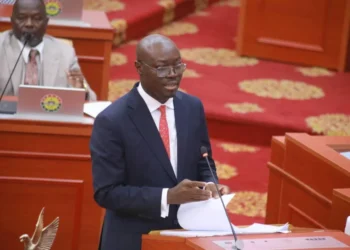The biggest opposition party, the National Democratic Congress (NDC) has indicated that the incumbent government’s approach in cleaning-up the financial sector was wrong.
The NDC stated that they have already laid the road map to improve the financial sector oversight with a wide range of institutional reforms and the passage of a number of new financial sector laws since 2016.
“…the banking sector issues were handled by the NDC administration, with the view of ensuring a sound, stable, and resilient financial sector to support inclusive economic growth. In contrast, the NPP decided to adopt a haphazard approach with a wrong sequencing of interventions and with no reference to the strategy that was in place under the previous NDC Government.
“It must be emphasized that these laws, which were passed under the NDC Government, were the very ones that provided a legal framework for the NPP’s financial sector exercise, but which was implemented wrongly”.
This was disclosed at the 2020 Manifesto launch of the party at the University of Professional Studies in Accra on Monday, September 7, 2020.
The NDC cited the “Bank of Ghana Amendment Act 2016 (Act 918), the Banks and Specialized Deposit-taking Institutions (BSDI) Act 2016 (Act 930), the Deposit Insurance (DI) Act 2016 (Act 931) and the Securities Industry Act, 2016, (Act 929)” as some of the legal framework they have laid for the financial sector clean-up when they were in office.
According to the NDC, “the D1 Act 2016 provided a comprehensive framework for dealing with distressed banks. These laws also strengthened the central bank’s powers in licensing, dealing with illegal banking and providing a transparent procedure for regulatory issuances.
“The NPP Government, however, adopted a wrong approach in their contrived financial sector clean-up”, the NDC added.
The NDC further indicated that they have already planned to announce “A new minimum capital requirement of GH¢230 million for banks…in early 2017 to be met by end-2019. This was much lower than the GH¢400 million subsequently adopted by the NPP Government without consultations with stakeholders”.
However, the Bank of Ghana has earlier stated that the clean-up has resulted in the growth of total assets of the Banking Sector by 54.9 per cent over the last three years.
Corroborating that, the 2nd Deputy Governor of the Bank of Ghana, Mrs. Elsie Addo Awadzi when speaking on a webinar organized by the Ghana Association of Restructuring and Insolvency Advisors (GARIA) on the Corporate Insolvency and Restructuring Act, 2020 (Act 1015) said that “Bank of Ghana’s latest financial soundness indicators show that while assets held by the banking sector in August 2017 when the reforms started stood at GH¢89.1 billion for a sector that had 36 banks, the total assets of the industry that now has 23 banks have increased significantly to GH¢138 billion at the end of the second quarter of 2020, with significant improvements in asset quality”.

As part of refunding payments to affected clients, the next NDC government promises to “pay the full amount due to every victim of the reckless handling of the financial sector clean up by the Akufo-Addo Government within one year in office”.
A strong and resilient financial sector is very key for the development of every economy. Availability of finance allows resources to be directed towards productive activities that might not have been undertaken due to lack of funds.
In less developed financial systems, frictions such as information asymmetry limit the amount of credit available for the expansion of newly productive firms, lowering productivity and output per worker.
Therefore, the finance sector is a very sensitive sector that must be handled with care and irrespective of the government in power, the essential role played by the sector should never be underestimated. Ghana will need a strong and robust financial sector in her quest to attain an upper middle-income status due to the vital role played by the sector in economic growth and development.























